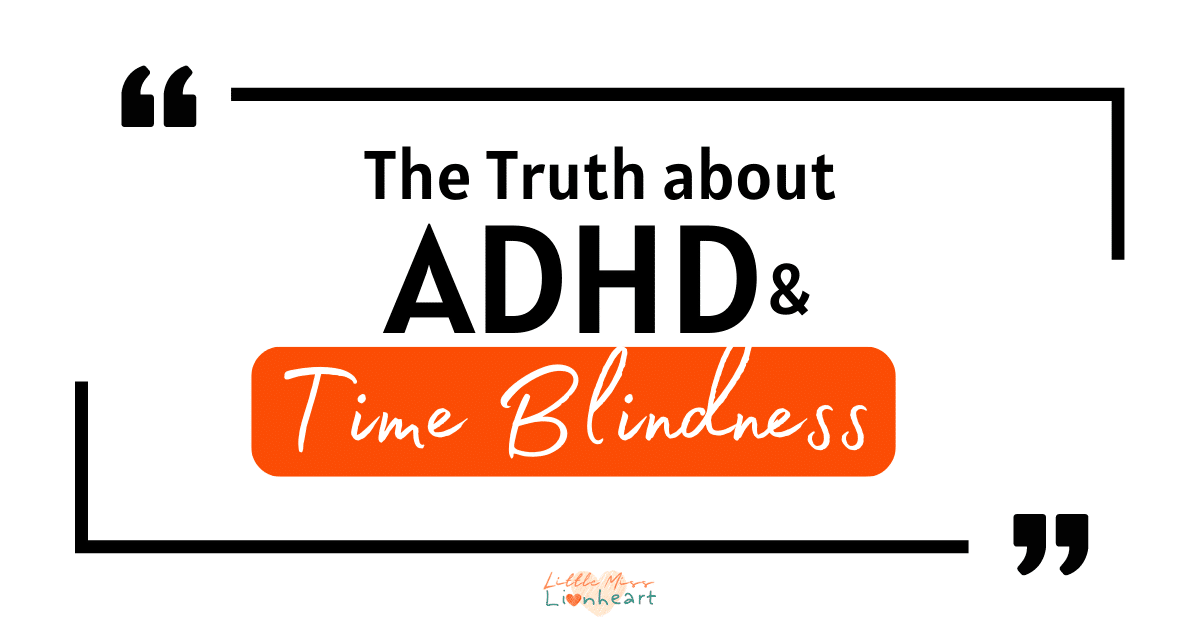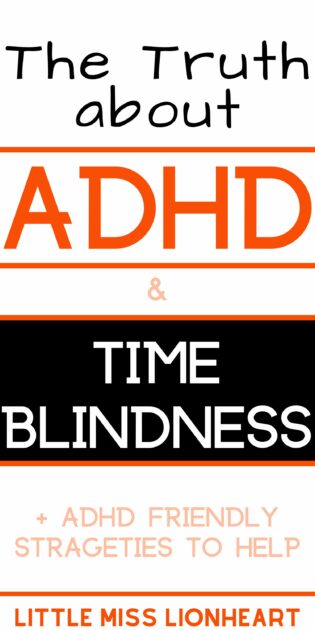
One of the many struggles life with ADHD presents is our perception of time. Ever wonder why people with ADHD are often late (or on the flip side, way too early)? Time blindness. Why we struggle with meeting deadlines? Time blindness. Or why we can get so absorbed in hyperfocus that we forget to eat, use the bathroom, or pick the kids up from school? You guessed it.
What is Time Blindness?
Time Blindness is the inability to sense and correctly estimate the passage of time. Interestingly enough, it’s considered a sensory processing challenge. Why?
The human body uses a mix of internal and external cues to recognize the passage of time. A subconscious part of the brain seems to measure time in heartbeats–it can reasonably estimate a minute based on the number of beats. Fascinating, right? Combined with other sensory cues–like brightness levels and temperature changes–and the neurotypical brain can reasonably estimate how much time has passed and how fast it’s moving.
You may have guessed already, but for those of us with ADHD, this process is disrupted and we experience a ton of challenges because of it.
[Take the ADHD Test for Women]
How does Time Blindness show up with ADHD?
People with ADHD often have a reputation for being chronically late, and this is why. If you struggle to interpret how quickly time is passing, it sneaks up on you. Before you know it, you don’t have enough time to get everything done and still get out the door on time. So then you’re late. Again. And people get frustrated, leading to social struggles, work struggles, etc…
But are there people with ADHD who are way too early? Yep. Though it’s not as common, it’s definitely a thing. In fact, I’m one of those weirdoes that shows up way too early for things. Again, this goes back to the struggle to recognize and correctly estimate the passage of time. Because I know I’m bad at this, I tend to give myself way too much time to get places. Once, I showed up to an appointment 45 minutes early and took a walk to kill time, only to get lost and end up late, anyway. Fun times with ADHD.
So keep in mind, time blindness can show up on both sides of the spectrum–underestimating OR overestimating time, its passage, how long things will take, how much time is left, etc…
Other ways it shows up:
- Missing deadlines
- Struggling to estimate how long it will take to do things
- Difficulty making a realistic schedule and sticking to it
- Losing track of time, feeling like you’ve lost time
- Particular struggles with anything involving a time crunch
- Correctly recounting the order in which things occurred
- Correctly repeating a task for the same time as you did before.
- Slow response or reaction times (like putting your hand up to catch a ball too late)
- Difficulty regulating the speed of movement (like trying to make yourself walk slower)
- Difficulty estimating how long ago an event happened, such as when answering seemingly simple questions like “when did you eat lunch?” or “when did you last go on vacation?”
Time Blindness is Part of Why We Struggle with Things Like:
Getting a text and planning to respond later, then suddenly remembering you never replied but no big deal, right? It’s only been a day…but actually it’s been two weeks and now you’re too embarrassed to reply.
Putting off that paperwork till right before it’s due thinking it’ll only take you a few minutes. But once you start it, you realize you actually needed several hours to complete it and now you’ve missed the deadline.
[How to Master Your To Do List When You Have ADHD]
Struggling to get anything done because you’ve got an appointment in four hours. Do you have enough time to work on things? Yep. And logically you probably know that. But does the rest of your brain recognize you have enough time to work on those things before your appointment? Of course not.
OR, the flip side: Four hours is a long time right? It’s practically forever. Plenty of time to run errands, do a little shopping, watch that tv show, cook some food…crap. Suddenly your appointment is in 10 minutes and it takes 30 to get there.
Funny enough, writing this article helped me finally understand why I struggle so hard to get the timing right when reading music. Another place it likes to make ADHD life harder than necessary, right?
Time blindness is why there are two ADHD modes: Now and Not Now but little to nothing in between for us. We’re ‘lucky’ like that.
How people with ADHD Can Cope with Time Blindness
Consciously track time
Chances are, if you’re estimating how long it will take to do something–thanks to our good friend time blindness–your estimation is off. So not helpful. Sometimes we overestimate how long something will take and end up putting it off (loading the dishwasher takes like…an hour, right? and I really don’t want to do them at all, much less for that long). Sometimes we underestimate, and put it off (All I need is 15 minutes to get that report done and turned in, I’ll do it the morning of).
It can make a big difference to actually time how long things take us. In fact, I learned I can load the dishwasher in 10 minutes or less and now I don’t put it off as badly. I can tell myself that I’ll spend 10 minutes loading the dishwasher and that’s a lot less overwhelming than it was before. I used to think I could write an article for this blog and get it published in an hour or two. Then I’d get frustrated when I didn’t get nearly “enough” done for the day. Finally, I timed it. Turns out, it takes me more like 5 to 6 hours to get everything done before publishing.
Now that I know, I can plan better and I get less frustrated with myself.
Use an Analog Watch
It’s no secret that visual cues usually work better for ADHD brains. Out of sight, often literally means out of mind for us. Though a digital clock isn’t “out of sight” in the sense we usually mean that sentiment, it might as well be. When you need to be somewhere at 1pm, for instance, seeing the numbers 12:44 spelled out digitally doesn’t hit us the same way that seeing clock hands do. Analog shows a visual representation of the time left between 12:44 and 1pm. It’s like seeing only a small piece of pie left and instinctively, the dwindling time hits us a little stronger.
Digital numbers spelled out give us only imagined context. Imagined time left. Analog is more tangible for us.
Stop Hyperfocus Before it Starts
It’s helpful if you know your time eaters so that you can be in better control of your time. I learned a while back not to start a book late in the evening because I’ll hyperfocus and be up reading until 3am on a work night. Or not to even start a show I’m obsessed with if I don’t have hours to binge it. Do you know your time sucks? The things that take over your brain and steal hours of your life before you even realize? If you don’t, figure out what they are, then you can start planning around them. Otherwise, they rule your time.
Overestimate Time and Work Backwards
Those of us with ADHD have a tendency to focus on the time we need to be somewhere and, believe it or not, that’s part of the problem.
Hear me out.
Say you need to be somewhere at 4pm. You’re focused on 4pm, reminding yourself of it throughout the day. Maybe you even have a reminder set that you need to be somewhere at 4pm.
The ADHD brain is so focused on 4pm, it’s like it forgets that you actually need to be moving well before 4pm. Until like 3:50. That’s when it kicks in that you have 10 minutes to get somewhere and you still need to take a shower before you leave.
Problem, right?
What we really need to do is identify what time we need to start getting ready and focus on THAT. So we work backwards.
We need to be there at 4pm. Google says it will take 20 minutes to get there, but we should add in buffer time (in case you take a wrong turn, get lost, google’s wrong, there’s road construction, etc…). I usually add in like 10-15 minutes to account for all of that plus actually getting out of my car and inside. So that puts us leaving at 3:25-3:30pm. Let’s say I need 25-30 minutes to get ready to go. That puts me needing to start getting ready by 3pm.
Now, if I focus on 3pm (instead of 4pm), I am way more likely to get there on time.
Since I add like 10-15 minutes to buffer time, I usually bring something to entertain myself with in case everything goes well and I have 15 minutes to kill.
You can do the same with other tasks that have deadlines. Figure out how long it should take you to do (preferably by timing yourself). Then add buffer time in case things come up you weren’t expecting.
It sounds simple. But it makes a big difference.
Using Alarms and Reminders
If you find that your lateness has a lot to do with forgetting or losing track of time, experiment with a way to remind yourself. When I’m doing something I know will kick me into hyperfocus before I have to be somewhere, I always set an alarm on my phone. If I don’t, I’ll end up missing the appointment.
If you find yourself starting to ignore alarms and reminders after a while, try changing them up. Change the sound of the alarm, the color of the sticky note reminder, etc… The ADHD brain often ignores things after they become repetitive, so keep it fresh.
Connect with Me
Time Blindness is massive pain, but with strategies like these in place, we can reduce its impact in our lives. What areas of Time Blindness do you struggle with the most? What strategies have you found that help?

Leave a Reply